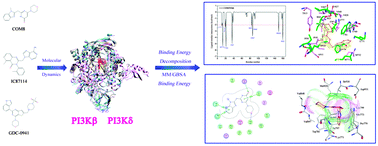Theoretical studies on beta and delta isoform-specific binding mechanisms of phosphoinositide 3-kinase inhibitors†
Abstract
Phosphoinositide 3-kinase (PI3K) is known to be closely related to tumorigenesis and cell proliferation, and controls a variety of cellular processes, including proliferation, growth, apoptosis, migration, metabolism, etc. The PI3K family comprises eight catalytic isoforms, which are subdivided into three classes. Recently, the discovery of inhibitors that block a single isoform of PI3K has continued to attract special attention because they may have higher selectivity for certain tumors and less toxicity for healthy cells. The PI3Kβ and PI3Kδ share fewer studies than α/γ, and therefore, in this work, the combination of molecular dynamics simulations and free energy calculations was employed to explore the binding of three isoform-specific PI3K inhibitors (COM8, IC87114, and GDC-0941) to PI3Kβ or PI3Kδ. The isoform specificities of the studied inhibitors derived from the predicted binding free energies are in good agreement with the experimental data. In addition, the key residues critical for PI3Kβ or PI3Kδ selectivity were highlighted by decomposing the binding free energies into the contributions from individual residues. It was observed that although PI3Kβ and PI3Kδ share the conserved ATP-binding pockets, individual residues do behave differently, particularly the residues critical for PI3Kβ or PI3Kδ selectivity. It can be concluded that the inhibitor specificity between PI3Kβ and PI3Kδ is determined by the additive contributions from multiple residues, not just a single one. This study provides valuable information for understanding the isoform-specific binding mechanisms of PI3K inhibitors, and should be useful for the rational design of novel and selective PI3K inhibitors.


 Please wait while we load your content...
Please wait while we load your content...